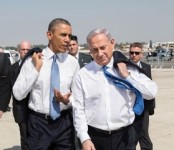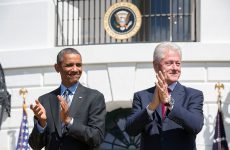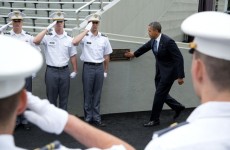
Obama – let bygones be bygones…
Barack Obama won, Bibi Netanyahu lost – so what happens now? After fighting a rear guard action to the bitter end, the Israeli leader finally threw in the towel. After forging the nuclear deal with Iran, the U.S. President will apparently be able to depart the White House in another 17 months with his grand strategy intact – no new American military involvement in the Middle East (or anywhere else for that matter). The Ayatollahs in Iran have emerged with a win-win victory. They have simply put their nuclear weapons program temporarily in mothballs and will now cash in with a bonanza of hundreds of billions of dollars.
The Iranians are not stupid. They were offered a deal they could not refuse and will probably abide by it, if grudgingly, for the near future. But there are few people in Israel and the Sunni Arab world who agree with the Obama administration’s hope that a more moderate regime will eventually take over in Tehran and everyone will live happily ever after. On the contrary, it will only be a matter of time before Ayatollah Khamenei, or his successor, gives the order for a nuclear break out. It’s not if, but when.
Meanwhile, those secret IAEA nuclear inspections will likely be a source of contention with the Iranians. It will now be up to history to pass judgment on the agreement and on those U.S. Democratic Senators who voted for it without actually knowing the most crucial details. But all that is now water under the bridge of the Potomac.
Bibi reckoned he had a fair chance to rally ‘grass roots America’ to persuade Congress to oppose the deal. Although opinion polls indicate that most Americans think it’s a bad deal, Obama swayed Democratic politicians. Was the Israeli leader right to take on the President and risk the ‘special relationship’ with America? In Israel, the opposition accuses Netanyahu of conducting a rash and reckless policy that has jeopardized Israel’s vital interests, and demands an official commission of inquiry.
But it is fair to say that Bibi did expose the failings of the nuclear deal and did arouse public opinion in America. The fact that this was not translated into the Senate vote is another matter. In fact, the House voted massively against the accord. Moreover, although the Israeli PM lost, he has created an awareness that the agreement, if the Iranians honor it, will enable them to legally break out in 10 or at the most in 15 years. It follows that at least for the time of the agreement there should be strict compliance and a swift and punitive response if Tehran starts violating it. Today, evidence that North Korea, Iran’s ally, is building a nuclear arsenal, should present a clear precedent for Iran. But in view of international rush to sign new trade agreements in Tehran, just how effective will the vaunted ‘snap back’ sanctions be?
Netanyahu – make the best of it…
So just how much damage has been done to Israeli-American relations? Surprisingly, as the dust now begins to settle, it appears to be very little. Obama has officially invited Bibi to the White House on November 9th. So for Bibi ‘it’s back to the drawing board’ – and he must now make the best of it. (He did give Obama a run for his money. Reportedly the Republican majority in the Senate and the obvious loop-holes in the accord forced Obama to set up a special operations ‘war’ room in the White House to work on public opinion). White House spokesperson Josh Earnest has said Obama will discus the agreement’s implementation that is designed to prevent Iran from acquiring nuclear weapons and to counter Iranian actions that undermine Middle East stability.
Netanyahu will now be open to American offers to bolster Israel’s security with new weapons systems – previously he deigned not to discuss this in order not to weaken his campaign to block the nuclear deal. But it is highly unlikely that Obama will offer those 30,000 pound bunker-busters that can destroy Iran’s underground nuclear facilities. In fact, the nuclear pact ties Israel’s hands when it comes to going it alone and launching a military strike against Iran in the near future; certainly not until Obama vacates 1600 Pennsylvania Avenue.
America has already started a program to militarily beef up its Arab allies in light of the tens of billions of dollars that will start pouring shortly into Iran’s coffers. No question that the Revolutionary Guards, the mainstay of the Ayatollahs, will demand their cut as well for military.
Netanyahu has fired some salvos against his critics at home who have hauled him over the coals for defying Obama:
“I hear so many experts and commentators who claim that my struggle against the Iranian nuclear deal has caused a rift, a collapse in our relations with the U.S. Clearly this has not been the case. There has been no such collapse nor will there be. Therefore I suggest that all these experts try to be a little more modest. I think I know how to navigate Israel’s foreign relations and to preserve our ties with the U.S., the best of our friends.”
Netanyahu, who is due to see Secretary of State John Kerry at the UN General Assembly at the end of the month, also contended he was duty bound to point out the loop holes in the nuclear accord:
“I will never understand why the sovereign state of Israel, which represents the Jewish people, could not wage a struggle against a nuclear agreement with a state that declares its intention to destroy us. I think this is not only my right, but my duty to point out the dangers. This does not harm the state of Israel; it serves it because everyone in the U.S., including those who support the deal, agree that Iran’s aggression must be opposed and also that Israel should be strengthened. This has also found expression in statements from President Obama himself.”
Let’s not forget Obama wants Jewish voters to again vote Democratic in the upcoming presidential election.
Israel’s red lines in Syria…
Meanwhile, the Russian ‘cavalry’ has arrived in Syria to save the faltering regime of President Bashar Assad. While the Americans are disengaging, the Russians and Iranians are moving in. And that is why Prime Minister Netanyahu has sought an urgent meeting with Russian President Vladimir Putin. Israel has stayed out of the Syrian bloodbath that has pitted Syrian rebels against Assad, who is supported by both Russia and Iran with military equipment and increasing personnel. The Shiite Hezbollah guerrillas from South Lebanon have at times borne the brunt of the fighting for Assad, and an estimated 1,000 Hezbollah fighters have been killed and many more wounded.
To date, Israel has set two red lines:
- Israeli air strikes interdict the supply of ‘game-changing’ weapons through Syria to Hezbollah in southern Lebanon. Since the Second Lebanon war with Israel in 2007, UN peace monitoring forces were tasked with preventing new weapons being shipped to Hezbollah in southern Lebanon. But the UN force has proven to be an abject failure; it is estimated that Hezbollah now has an arsenal of some 100,000 missiles and rockets aimed at Israel.
- The other red line is against the stationing of Hezbollah fighters on the Golan Heights which borders on northern Israel and thousands of Israeli civilians. Israel made that point when an Israeli air strike took out a senior Hezbollah commander and an Iranian general who were touring the Golan, reportedly devising a plan to launch attacks against Israel.
The danger now is that the influx Russian ground troops, aircraft including helicopters, could bring them in close proximity to Israeli forces. There is no beef between Israel and Russia, which are actually on relatively friendly terms. But the fact that IDF Chief of Staff Gadi Eizenkot may accompany Bibi to Moscow indicates the Prime Minister does not want any misunderstandings or mishaps in light of the evolving situation in Syria. Moscow has informed Jerusalem that its forces in Syria are solely to prop up the Assad regime and do not threaten Israel. Apparently Netanyahu wants to hear it from the horse’s mouth with the IDF Chief of Staff listening in.
Temple Mount link to Israel’s regional alliances…
While the Israeli leader is trying to sort out his tricky relations with Obama and Putin, there is also another group of players who need tending. It’s no secret that the Sunni Arab states – Saudi Arabia, Jordan, Egypt, and the Gulf States are dismayed, in private, by the Iranian nuclear deal with their Shiite rival, Iran. This has opened the door slightly to their drawing closer to the Jewish state.
Egypt and Israel see eye to eye on confronting the fanatical Muslim Brotherhood and Hamas. Israeli and Egyptian military forces are actually cooperating when it comes to confronting Islamists in Sinai, who now include Islamic State terrorists. Jordan’s King Abdullah is now threatened by Islamic State, which has moved closer to his border from Iraq. Neither is it a secret that Abdullah will look for Israel’s military aid if Islamic State does attack his country. Saudi Arabia and Iran are archenemies going way back, and Riyadh has quietly warmed up relations with Jerusalem.
However, it is the religious flare-up over the Temple Mount in Jerusalem, and Palestinians hurling Molotov cocktails and rocks in Jerusalem that has thrown a wrench into the works. One Israeli civilian was killed by a rock and more have been injured in a flurry of violence. The attacks occur along the ‘seam line’ between east and west Jerusalem. But the rest of the city is as calm as ever. Israeli police have been reinforced, but the rioters, mainly teenagers, have kept up the barrage.
The government is considering mandatory prison sentences and the stationing of snipers to shoot at rioters caught in life-threatening situations. They would be armed with low caliber 0.22 bullets. In addition, Jewish religious fanatics have added fuel to the flames by carrying out provocative acts on Temple Mount, the site of Al Aqsa Mosque as well as the First and Second Jewish Temples.
The Temple Mount is a flashpoint in the entire Muslim world, forcing King Abdullah and Saudi leaders to condemn Israel, despite the fact that Palestinian rioters have initiated the violence. The ‘moderate’ Palestinian President Mahmoud Abbas, who professes to oppose violence even declared on Palestinian TV:
“We will never agree that Haram al Sharif Temple Mount (of the Jews!) will be defiled by the filthy feet of Jews.”
Although Israel recognizes the right of Muslims to pray at the Al Aqsa mosque on Temple Mount (that was co-opted by the Muslims), the Palestinians object to any similar right of Jews to pray on Temple Mount where the Israelites first built the two Temples.
Aside from the need to quell the dangerous flare up, it is also essential for Netanyahu to find a solution before it reaches a full blown intifada and to forge an alliance with the Sunni Arab states in the face of Iran, which poses an even greater threat to the region in the wake of the nuclear deal.




